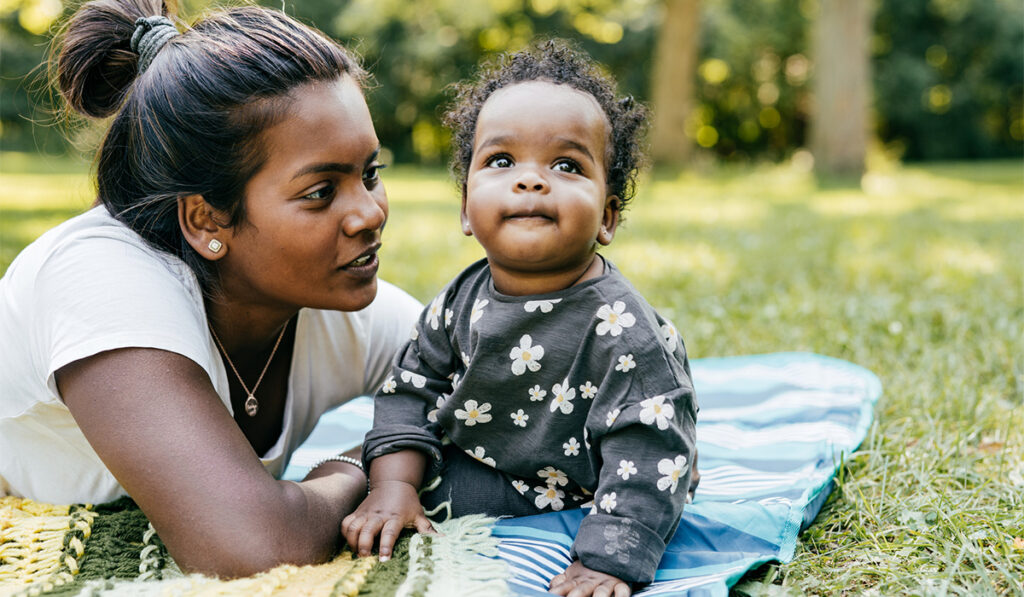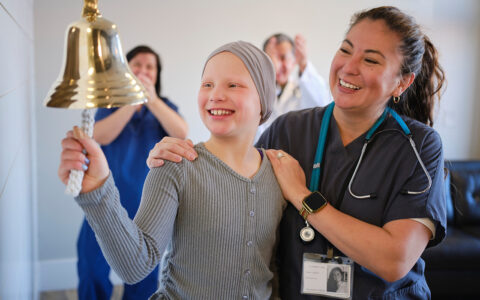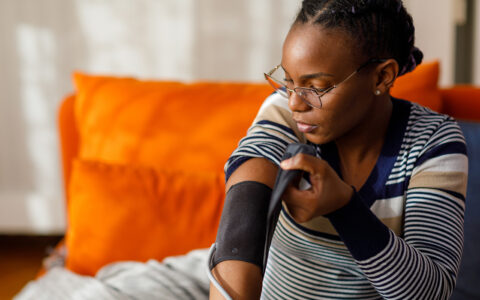Babies whose birth parent was fully vaccinated against COVID-19 during pregnancy were at lower risk of being hospitalized with the virus during their first six months of life, a recent study published in the New England Journal of Medicine has shown.
The optimal timing for vaccination proved to be late in the second trimester of pregnancy or early in the third, showing optimal gains over babies born to the unvaccinated, said Natasha Halasa, M.D., the article’s first author and Craig Weaver Professor of Pediatrics, Infectious Diseases at Vanderbilt University Medical Center.
“Right now, COVID-19 vaccines are not available for children under six months, thus preventing direct protection; therefore, they have to rely on their mom being vaccinated during pregnancy and passing antibodies on to them,” Halasa said.
COVID-19 and flu infections often lead to poor maternal and neonatal outcomes, including preterm delivery, she added.
“Vaccination is like a two-for-one. The pregnant person protects themselves and their infants.”
Young infants are at increased risk for severe COVID-19 and affected infants have died from the illness.
As of June 24, 2023, 776 children under four years of age had died from COVID-19 in the United States, according to the National Center for Health Statistics. Another study that analyzed infant mortality statistics in low- and middle-income countries found that overall infant deaths rose by 22 percent and neonatal mortality increased by 27 percent in the two years after the COVID-19 pandemic began in March 2020.
Addressing the Question of Timing
Halasa’s research team, comprising people from dozens of leading U.S. medical institutions, conducted their larger study to confirm their previous findings about maternal vaccination, which confirmed that the birth parent’s vaccination protected the youngest infants from COVID-19.
This new investigation also sought to determine how vaccination at different phases of a pregnancy might affect the level of the protection an infant received, with the larger patient pool enabling this more specific gathering of data.
The new case-controlled study involved 537 infants younger than six months who had been hospitalized for COVID-19 and 512 infants in the same age range who did not have a proven SARS-CoV-2 infection when they entered the hospital.
The participating infants were admitted to 30 pediatric hospitals in 22 states between July 1, 2021, and March 8, 2022. The hospitals were all involved in the CDC-funded Overcoming Covid-19 Network.
One-Fifth Admitted to ICU
Among the 537 cases, 181 were admitted during the delta variant wave of the pandemic and 356 during the omicron wave.
Twenty-one percent of the cases (113 infants) required care in the ICU. Twelve percent of the cases (64 infants) needed mechanical ventilation or vasoactive infusions. Vaccine effectiveness against admission to an ICU for COVID-19 was 70 percent overall.
“Most of the infants admitted to an ICU for COVID-19 (90 percent) had been born to unvaccinated mothers,” the authors wrote.
Certain Cases Excluded
The research team defined full vaccination as someone having received two doses of one of the mRNA vaccines produced by Pfizer or Moderna.
“We excluded case infants whose mothers had been vaccinated less then 14 days before they were born, because the mother herself doesn’t have full protective immunity until about two weeks after she’s vaccinated,” Halasa said.
The team also excluded infants born to people who had received a third COVID-19 vaccination, or a non-mRNA vaccination, such as the Johnson & Johnson formulation.
Protection Stronger for Delta
The effectiveness of maternal vaccination against hospitalization for COVID-19 among infants was 52 percent overall.
“Effectiveness was different for the two variants. It was 80 percent when delta was the main strain in circulation and 38 percent when omicron was predominant.”
“But the effectiveness was different for the two variants,” Halasa said. “It was 80 percent when delta was the main strain in circulation and 38 percent when omicron was predominant.”
Infants born to mothers vaccinated during pregnancy have higher levels of anti-spike antibodies compared to mothers with natural SARS-CoV-2 infection, the authors point out.
“These kinds of findings are changing the paradigm. There are vaccines that not only protect moms but also their babies, and not just for COVID – also for flu, tetanus, and pertussis, and now for RSV too,” Halasa said.
Recommend Vaccines During Pregnancy
Halasa noted that hesitancy about vaccines of many types is common among those who are pregnant.
“Now, with COVID-19 still causing hospitalizations, it is a great time to remember we have these vaccines that not only protect moms but also their babies. Doctors need to be recommending this to their patients, and patients need to ask for it during their pregnancy,” she said.






